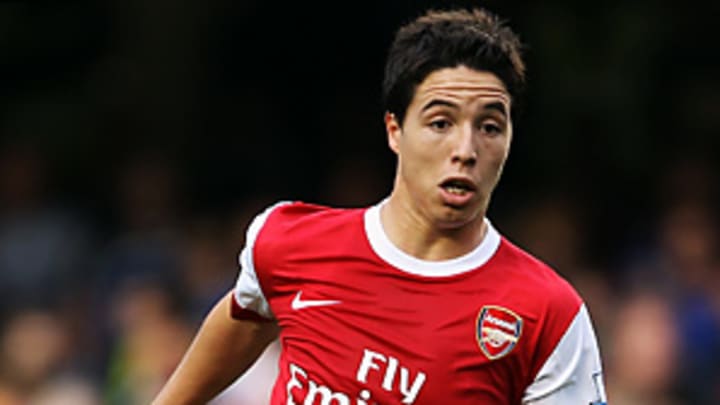Arsenal's Nasri mulls his future


Samir Nasri has always known his own value, and that sense will be keener now than ever before. The midfielder, voted France's Player of the Year for 2010, has one more year left on his Arsenal contract, and is the subject of serious interest from Premier League champions Manchester United and, reportedly, Manchester City. His dilemma: should he stay or go?
After the final game of last season, a campaign in which he partly excelled (except the last few months, when he was in a funk while contract talks stalled), Nasri addressed his future, telling Canal Plus: "I know how much I owe to Arsenal and Arsene Wenger, and I want my future to be at Arsenal."
The 23-year-old is a canny operator, and he chose his words carefully: between the lines, he was challenging the club to present him with the contract offer he wants. That has not yet happened, and now Arsenal faces the very real possibility of losing not only captain Cesc Fabregas to Barcelona, but also Nasri, his mooted successor as leader.
The argument that Fabregas's departure makes it more likely that Nasri will stay -- so he can receive, as they say in France, "the keys to the shop" -- is a flawed one, and does Nasri a disservice. For him, it is more important that he is part of a team that wins trophies, rather than has a team built around him.
The fact that Nasri has only ever won a single trophy in his career, the U-17 European Championships back in 2004, bothers him greatly. His quest for trophies is a regular refrain in interviews. "I came to Arsenal to win trophies," he told L'Equipe. "Without any trophies, you don't have a chance of the Balon D'Or," he said to France Football. And it's hard to see how Arsenal's chances of success increase without Fabregas in the side.
In May, former France captain Patrice Evra made a public plea to Nasri to consider joining him at United. "Little Prince [Nasri's nickname], if you want to become a king, you know where you should go. Every year, we play to win and every year is a guarantee of a trophy," he told L'Equipe. It was laughed off at the time as cheeky banter but Evra knew exactly what buttons to press. He also has the medals to back it up: in five years, Evra has won four Premier League titles, three League Cups and Community Shields, as well as one Champions League and a Club World Cup: slightly more impressive than a youth competition from seven years ago.
Nasri has an excellent relationship with Wenger, crediting him for huge improvements "in every aspect of my game." He was only 21 when he moved to London from Marseille, burdened with the "new Zinedine Zidane" tag. Wenger was patient, supporting Nasri after he broke a leg in preseason 2009, and commiserating with him when he missed out on France's World Cup squad last summer. While Les Bleus were embarrassing themselves in South Africa, Nasri traveled to Los Angeles, Las Vegas and Dubai, then started preseason before anyone else, mountain-running in Italy, which explained his explosive early-season form.
France's World Cup also improved Nasri's reputation back home. The behavior of Nasri and Karim Benzema, another Clairefontaine graduate from 1987, had been blamed for the poor atmosphere at Euro 2008, though both men denied it.
"It needed that World Cup for people to understand that the bad atmosphere in the France team didn't come from me," Nasri told France Football. Since then, Nasri has displaced Yoann Gourcuff as France's playmaker, and was outstanding in the team's 2-1 Wembley win over England last November.
Nasri is confident and strong-minded. When a French TV documentary crew filmed some junior players from Marseille's youth teams, they zoomed in on Nasri, who was then just 11 years old. He spoke to them, standing next to his father, pitch-side at the Stade Velodrome: "I can see myself playing on this pitch, with fans cheering me. I know it will happen," he said.
More recently, he had a public row with William Gallas, who wrote in his book that Nasri had deliberately sat in Thierry Henry's seat on the team bus at Euro 2008 (you couldn't make it up). The pair never spoke during the following season they were both at Arsenal, and once Gallas had moved to rivals Tottenham Hotspur, Nasri made waves by refusing to shake Gallas's hand before a match.
"When I don't like someone, I tell him and I don't shake his hand. I am genuine, that's all, so I wasn't going to behave as if it was all fine," he said to France Football. "One thing's for sure, I won't shake his hand the next time we meet."
While admirable, Nasri's intransigence could work against Arsenal in the current situation. "I don't like being walked over, and if I don't agree with someone, I will always say so," he added.
Nasri is in a position of great strength, and would not be daunted by the prospect of moving to a rival club, not least because of the rich history of successful French players at Old Trafford (even if the Gunners connection of Kolo Toure and Emmanuel Adebayor has not been such a hit at City). Arsenal could lose Nasri for nothing in 12 months, but the loss will be even more significant, and painful, if he moves to Manchester this summer.
Ben Lyttleton has written about French football for various publications. He edited an oral history of the European Cup, Match of My Life: European Cup Finals, which was published in 2006.
